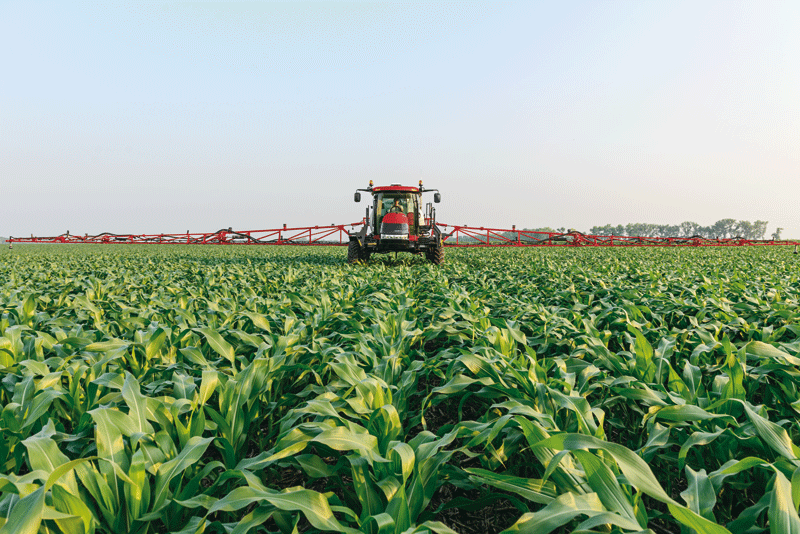Water quality and chemical efficacy
IS THERE A CONNECTION?
MOST GROWERS KNOW that the performance of chemicals — such as herbicides, fungicides, and pesticides – is dependent on a number of factors. These factors can include correct product selection, equipment calibration, nozzle choice, weather at the time of application, and following label instructions. Many, though, do not know that water quality could play an important role in chemical performance too.

“Depending on what you’re spraying, it can be very important,” says Jason Deveau, application technology specialist with the Ontario Ministry of Agriculture, Food and Rural Affairs. The three big variables growers should consider are pH, dissolved mineral content (water softness or hardness), and suspended particles in the water.
“Poor water quality can lessen the effectiveness of the pesticide and influence how it interacts with the atmosphere and the surface of the target,” says Deveau. “For example, certain pesticide molecules can be deactivated by binding with cations, like calcium, magnesium, or iron.”
Quite often, where water quality is known to affect pesticides, the label will carry a warning. In some cases, though, it does not. So how are growers supposed to know if their water is affecting the efficacy of crop chemicals on their farm? The simple solution is to have the water tested, says Deveau.
Tom Wolf, spray application specialist with AgriMetrix Research & Training, agrees with Deveau and cites the same three water quality factors to consider. Water hardness is the most important issue to spray application efficacy, he says, but it is fairly easy to test for and fairly easy to correct for.
“Some of our most important herbicides are possibly affected by it, so it’s important to pay attention – the most important of which is glyphosate,” says Wolf.
WATER HARDNESS
Hard water sources typically, but not always, come from wells. “Water that has gone through a number of layers of rock does tend to pick up some of these hardness cations,” says Wolf.
If you suspect that you have a water hardness issue, Wolf also recommends getting a proper water test done by a lab. He cautions you will likely get more information than you need. Look for “total hardness” on the test results sheet. It is usually expressed as a calcium carbonate equivalent or CaCO3 in parts per million (ppm).
“Typically, we look for the number 350 ppm. If your hardness is less than 350 ppm then you’re probably okay,” he says. “You likely have water that might be moderately hard, but won’t affect herbicide efficacy. If it’s above that then you have a hardness issue. The single best thing to do is to add an adjuvant that corrects for that. The adjuvant of choice is ammonium sulfate.”
Ammonium sulfate is a fertilizer available in either dry or liquid form. The sulfate ion in the fertilizer ties up the cations that are responsible for antagonizing the herbicide — typically, calcium and magnesium. Some companies offer rate recommendations. Monsanto, for instance, offers rates for specific levels of hardness.
“Typically, it’s about one per cent weight by volume, so one kilo of 21-0-0-24, which is a dry formulation of ammonium sulfate fertilizer for every 100 litres of water you have in your spray tank,” says Wolf. “That’s usually sufficient.”
WATER BICARBONATE OR ALKALINITY
Bicarbonate content and/or alkalinity should also be considered. Although not much is known about it, bicarbonate has been blamed for the reduced activity of some herbicides, and it has also been implicated in reduced mix-ability of some herbicides, although this is somewhat rare and can be difficult to understand.
“From what I’ve read and learned, the typical solution to it is ammonium sulfate,” says Wolf.
TURBIDITY
Water that contains suspended solids, such as soil particles, is said to be turbid. It is not usually a problem in well water; it is usually a problem in surface water.
“Soil is negatively charged and it can interact chemically — tightly bond — with some other- charged herbicides,” says Wolf. “The most important one is glyphosate, which is highly charged and will bind very strongly with soil, becoming inactivated. The solution to this problem is simply to use clean water.”
Water quality does not just affect efficacy, though, says Deveau. Scale from hard water, for instance, can build up on spray nozzles, which can also impact chemical efficacy.
“The best advice here is to clean the nozzles after every spray day, which is the best general practice in any case,” says Deveau. “This should help prevent the accumulation of scale. The same goes for the tank and lines — to prevent build up, clean after every spray day.”
OTHER RESEARCH FINDINGS
It should be noted that not all researchers think water quality affects chemical efficacy. Peter Sikkema, field crop weed management specialist at the University of Guelph Ridgetown Campus, has tested water from a variety of sources over a two to three year period, including water from Erin, Ontario with 1,799 ppm hardness. Although he thought he would see a water quality effect, they observed no differences at all.
“We did not find a big effect of water quality on herbicide performance,” says Sikkema. “I do not have an answer.” •























